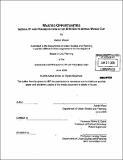Wasted opportunities : inequality and fragmentation in the 2010 South Africa World Cup
Author(s)
Wood, Astrid
DownloadFull printable version (58.43Mb)
Alternative title
Inequality and fragmentation in the 2010 South Africa World Cup
Other Contributors
Massachusetts Institute of Technology. Dept. of Urban Studies and Planning.
Advisor
Diane E. Davis.
Terms of use
Metadata
Show full item recordAbstract
(cont.) This thesis will examine the possibilities for cities to use the 2010 World Cup to hasten city development. The first chapter will detail the 2010 World Cup plan and the local stakeholders as well as the lessons learned from previous World Cups. The next chapter will examine the obstacles South Africa faces as it prepares for the 2010 World Cup and characteristics that make this host country different from previous World Cup hosts. Chapter three will describe the development strategy and explain how World Cup infrastructure can change the city. The next chapter will illustrate the World Cup conflict resulting from these development decisions. The final chapter will explain the reasons why local organizers are wasting this opportunity, instead exacerbating inequality and fragmentation, and conclude with suggestions for future World Cup planners. Planning and preparations for the 2010 South Africa FIFA World Cup are well underway and there is little doubt that South Africa will impress sports fans and spectators with the modern stadiums and tourist facilities. The 2010 World Cup is an opportunity to hasten social, cultural, environmental, economic, and physical growth. South African cities should use 2010 to improve the public realm and create new economic opportunities for South Africans.Megaevents like the 2010 World Cup can generate economic investment and build an international image, but South Africa can also use World Cup funding to invest in the public realm. South Africa is economically, socially, and spatially fragmented. As South Africa struggles with issues of racism, inequality, crime, and poverty, development for 2010 offers an opportunity to unify the fragmented community through design. Development projects and urban investments for the 2010 World Cup can transform the city and stimulate new development patterns. Host cities can use new stadiums, transportation infrastructure, and tourist facilities as part of city improvement plans. Design, project sitting, and city policies can alleviate or exacerbate urban fragmentation by enticing infill development or wastelands. Considering the enormous public expenditures, it is imperative for cities to include substantial city improvements in the planning repertoire.Unfortunately, World Cup planners are not maximizing this opportunity. Planning for the WC tends to focus on economic development and image enhancement, instead of the possibilities for city improvements. Ideal city development often conflicts with international hosting requirements and deadlines. Despite high expectations, infrastructure projects are too focused on the ephemeral and not on the permanent.
Description
Thesis (M.C.P.)--Massachusetts Institute of Technology, Dept. of Urban Studies and Planning, 2008. Includes bibliographical references (p. 159-166).
Date issued
2008Department
Massachusetts Institute of Technology. Department of Urban Studies and PlanningPublisher
Massachusetts Institute of Technology
Keywords
Urban Studies and Planning.